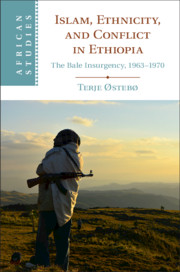Book contents
- Islam, Ethnicity, and Conflict in Ethiopia
- African Studies Series
- Islam, Ethnicity, and Conflict in Ethiopia
- Copyright page
- Dedication
- Contents
- Maps
- Figures
- Tables
- Acknowledgments
- Map
- 1 Introduction
- 2 Islaama Peoplehood and Landscapes of Bale
- 3 Conquest and Resistance
- 4 Bale at War
- 5 The Insurgency: Fighters and Fragmentation
- 6 Peasant Insurgency without Peasants
- 7 Land Tenure and the Land-Clan Connection
- 8 Christianity, Nation, and Amhara Peoplehood
- 9 Trans-local Dynamics: The Bale Insurgency in the Context of the Horn
- 10 Islaama vs Amhara and the Making of Local Antagonism
- 11 The Bale Insurgency, Islaama, and Oromo Ethno-nationalism
- 12 Conclusions
- Glossary
- References
- Index
- African Studies Series
3 - Conquest and Resistance
Published online by Cambridge University Press: 28 September 2020
- Islam, Ethnicity, and Conflict in Ethiopia
- African Studies Series
- Islam, Ethnicity, and Conflict in Ethiopia
- Copyright page
- Dedication
- Contents
- Maps
- Figures
- Tables
- Acknowledgments
- Map
- 1 Introduction
- 2 Islaama Peoplehood and Landscapes of Bale
- 3 Conquest and Resistance
- 4 Bale at War
- 5 The Insurgency: Fighters and Fragmentation
- 6 Peasant Insurgency without Peasants
- 7 Land Tenure and the Land-Clan Connection
- 8 Christianity, Nation, and Amhara Peoplehood
- 9 Trans-local Dynamics: The Bale Insurgency in the Context of the Horn
- 10 Islaama vs Amhara and the Making of Local Antagonism
- 11 The Bale Insurgency, Islaama, and Oromo Ethno-nationalism
- 12 Conclusions
- Glossary
- References
- Index
- African Studies Series
Summary
The chapter’s locally emplaced focus on Menelik’s conquest “from below” fills important gaps in Ethiopian history that enable us to get a more complete picture of a crucial time period. Detailing the violent campaigns, it provides insights on how it was experienced in local contexts and discusses the deep impacts it had on the Arsi Oromo. The involuntary incorporation into the Ethiopian Kingdom meant that they had to submit to an alien and hegemonic regime focused on extracting as many resources as it could from its new territories. The chapter underscores that the Arsi Oromo saw the arrival of Menelik’s soldiers as an intrusion and that the new realities entailed subjugation and loss of autonomy. It moreover discusses the Arsi Oromo’s acts of resistance from the early days of the conquest into the twentieth century. It concludes that it is far from clear that the Arsi Oromo at the time viewed the conquest as part of a larger program of internal colonization – as it has later been interpreted – and that detailed micro-studies of the conquest serve to nuance the unproductive dichotomy of viewing it either as a process of national unification or as acts of illegitimate colonialization.
- Type
- Chapter
- Information
- Islam, Ethnicity, and Conflict in EthiopiaThe Bale Insurgency, 1963-1970, pp. 66 - 88Publisher: Cambridge University PressPrint publication year: 2020

